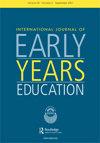Which play is better? Different play types and development of executive functions in early childhood
IF 1.3
Q2 EDUCATION & EDUCATIONAL RESEARCH
International Journal of Early Years Education
Pub Date : 2022-06-22
DOI:10.1080/09669760.2022.2091979
引用次数: 6
Abstract
ABSTRACT In this study we aimed to compare the contribution of each play type to the development of different EFs components: shifting, working memory (visuospatial and auditory) and inhibition (two aspects of cognitive inhibition and physical inhibition). Following a preliminary examination of EFs was the intervention, which consisted of 14 play sessions for 20–30 min twice a week. Participants (n = 199, 46.7% females), aged from 52 to 69 months (M = 60.79; SD = 4.10) were assigned to one of five experimental groups: three types of role play (free role play; adult-directed play; child-directed play), digital games, games with rules (board games). All the measured EFs significantly increased following the digital games’ intervention. In ‘Games with rules’ and ‘Adult-directed play’ intervention groups, significant changes were registered in 5 (out of 6) measures of EFs. In the ‘Free play’ and ‘Child-directed play’, significant changes were found in 4 measures of EFs. Differential effect of play on EFs components is discussed. These results demonstrate the importance of play for EFs development and given the differential effect of play types, those can be applied based on the children’s needs.哪部戏更好?儿童早期不同游戏类型与执行功能的发展
摘要在本研究中,我们旨在比较每种游戏类型对不同EFs成分发展的贡献:移位、工作记忆(视觉空间和听觉)和抑制(认知抑制和身体抑制两个方面)。在对EF进行初步检查后,进行了干预,包括20–30次的14次游戏 每周至少两次。参与者(n = 199,46.7%为女性),年龄在52至69个月之间(男性 = 60.79;SD = 4.10)被分配到五个实验组之一:三种类型的角色扮演(自由角色扮演;成人指导的游戏;儿童指导的游戏)、数字游戏和有规则的游戏(棋盘游戏)。数字游戏干预后,所有测量的EF都显著增加。在“有规则的游戏”和“成人指导游戏”干预组中,EF的5项(6项中的5项)指标发生了显著变化。在“自由游戏”和“儿童指导游戏”中,EFs的4项指标发生了显著变化。讨论了间隙对EFs组件的微分效应。这些结果证明了游戏对EFs发展的重要性,并考虑到游戏类型的差异效应,这些可以根据儿童的需求进行应用。
本文章由计算机程序翻译,如有差异,请以英文原文为准。
求助全文
约1分钟内获得全文
求助全文
来源期刊

International Journal of Early Years Education
EDUCATION & EDUCATIONAL RESEARCH-
CiteScore
2.30
自引率
5.30%
发文量
50
 求助内容:
求助内容: 应助结果提醒方式:
应助结果提醒方式:


